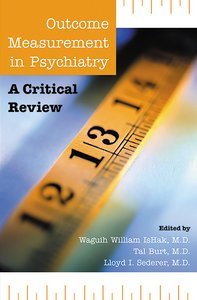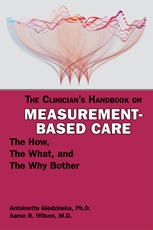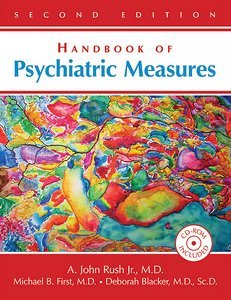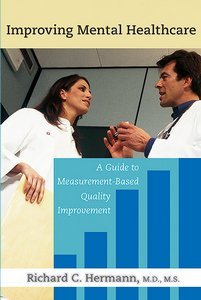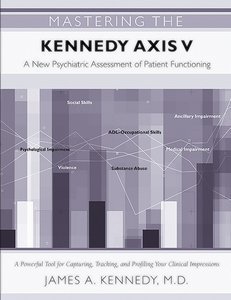Outcome Measurement in Psychiatry
A Critical Review
View Pricing
Description
The past several decades of price wars in medicine have taken their toll—and nowhere has the impact been greater than in the field of psychiatry. Today, patients and physicians alike are protesting—louder than ever—that quality patient care is being sacrificed to cost-cutting goals.
What is quality patient care? Quality measures (i.e., validity, reliability, feasibility, usability, and comparability) link the care rendered to the results (i.e., outcomes) of that care, enabling us to define, measure, publicly report, compare, and ultimately improve care.
This remarkable volume offers a critical analysis of outcome assessment, in psychiatry, which allows us to assess not only the measurable domains (i.e., symptoms, functioning, quality of life, and perception of care), but also the standards and instruments used to judge the quality of care.
Divided into three major sections, this comprehensive textbook is more than just an inventory or nosology of measures; rather, it holds existing instruments to clear standards.
- Section I, Understanding Outcomes Assessment, details the many fundamental concepts that underlie outcome measurement, including a situational analysis of outcome assessment, the scientific underpinnings of the field, and its important constructs (e.g., process and outcome, efficacy and effectiveness, basis statistics, quality improvement).
- Section II, A Critical Review of the Instruments, critiques a wide variety of instruments that have high clinical utility, are in the public domain or of low cost and burden, and meet many of the quality standards of validity, reliability, feasibility, usability, and comparability. Organized by patient population (age, diagnoses, and disorders), these chapters describe both general and disorder-specific measures, with respondents that include patients, families, and clinicians. Data generated by these instruments therefore can be used to assess outcomes for individual patients, populations, and programs.
- Section III, Challenges and Opportunities, discusses the obstacles to implementing assessment programs, regulatory and accreditation demands, confidentiality and training, and the technology of measurement and proven solutions, including a final chapter on future innovations using various types of brain imaging; laboratory tests (e.g., for homovanillic acid); immunological tests (e.g., G-protein and plasma prolactin, the hypothalamic-pituitary-adrenal axis); and acoustic (e.g., the flat affect of a patient's voice) and other technological tests.
The three editors of this meticulously researched and written compilation have brought together the work of 48 distinguished contributors who, responding to today's mandate of public accountability, provide clinicians and clinical leaders with the tools they need to meaningfully incorporate quality measurement into clinical practice.
Contents
- Introduction.
Part I: Understanding outcomes assessment.
Role of outcome measurement in psychiatry. Outcome measurement from research to clinical practice. Linking outcome measurement with process measurement for quality improvement. Validity, reliability, and other key concepts in outcome assessment and services research.Part II: A critical review of the instruments.
Outcome measurement in children and adolescents. Outcome measurement in geriatric psychiatry. Outcome measurement in forensic psychiatry. Outcome measurement in patients receiving psychosocial treatment. Outcome measurement in serious mental illness. Outcome measurement in mood disorders. Outcome measurement in anxiety disorders. Outcome measurement in substance use disorders. Outcome measurement in somatoform disorders. Outcome measurement in personality disorders. Outcome measurement in sleep disorders. Outcome measurement in sexual disorders. Outcome measurement in eating disorders. Patient satisfaction and perceptions of care.Part III: Challenges and opportunities.
Implementation of outcome assessment in systems of mental health care. Resistance to the implementation of outcome measures. Efforts of regulatory, professional, and accreditation authorities. Confidentiality and outcome. Training psychiatry residents in outcome measurement. Use of technology in outcome measurement. Innovative approaches in outcome measurement: a futuristic view. Appendix A: Example of a depression treatment and outcome monitoring pathway. Appendix B: Selected outcome measures. Index
About the Authors
Waguih William IsHak, M.D., is Research Assistant Professor of Psychiatry at New York University School of Medicine, and Director of the Psychiatry Residency Training Program at Cedars-Sinai Medical Center in Los Angeles, California.
Tal Burt, M.D., is Medical Director of the Depression/Anxiety Worldwide Team at Pfizer, Inc., and Assistant Professor of Clinical Psychiatry at Columbia University College of Physicians and Surgeons in New York, New York.
Lloyd I. Sederer, M.D., is Director of the Division of Clinical Services at the American Psychiatric Association in Washington, D.C., and Associate Clinical Professor of Psychiatry at Harvard Medical School in Boston, Massachusetts.
Related Products
Carousel Control - items will scroll by tabbing through them, otherwise arrows can be used to scroll one item at a time
